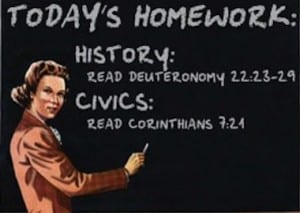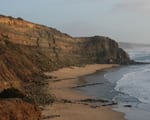An essay by SMU religious studies expert Mark A. Chancey details his research findings published in his new report, “Reading, Writing & Religion II.” Chancey’s research found that most of the 60 public school districts in Texas that offer Bible study courses aren’t meeting a 2007 state law mandating that the courses be fair as well as academically and legally sound.
Chancey prepared the report for the Austin-based education watchdog group Texas Freedom Network. His study uncovered bias, factual errors and insufficient curriculum standards in Texas public school Bible courses.
An SMU Religious Studies professor, Chancey recommends the Texas State Board of Education develop Bible course curriculum standards and the Texas Education Agency be allowed funds for a teacher training program.
“As a biblical scholar and especially as a parent, I want our state’s public schools to take the study of the Bible’s influence as seriously as they do the study of science or history,” Chancey told The Dallas Morning News. “Academically, many of these classes lack rigor and substance, and some seem less interested in cultivating religious literacy than in promoting religious beliefs. Their approach puts their school districts in legal jeopardy and their taxpayers in financial jeopardy.”
Chancey, a professor in SMU’s Dedman College of Humanities and Sciences, has devoted considerable attention to the constitutional, political and academic issues raised by religion courses in public schools.
EXCERPT:
By Mark A. Chancey
What would Supreme Court Justice Tom Clark think of public school Bible courses that taught that Jewish festivals are actually typological predictions of Jesus, that the “African races” are descendants of Noah’s cursed son Ham, that biblical stories about angels may have referred to extraterrestrial visitors, or that Genesis’ six-day creation story is scientifically accurate if interpreted correctly?Clark is the justice who penned the Court’s majority opinion in the 1963 case of Abington Township School District v. Schempp, known primarily for prohibiting public school officials from reading Bible verses to captive student audiences, though it also hinted at the possibility of constitutionally appropriate study of religion in public education:
“It certainly may be said that the Bible is worthy of study for its literary and historic qualities. Nothing we have said here indicates that such study of the Bible or of religion, when presented objectively as part of a secular program of education, may not be effected consistently with the First Amendment.”
However, the above examples from the state of Texas—where 57 school districts and three charter school systems offered high school Bible courses in 2011-2012—suggest that 50 years after the gavel dropped in Schempp, some schools are still struggling when it comes to discussing the Good Book “objectively.”
Recently, citing the Texas Public Information Act, Texas Freedom Network contacted those schools and asked that they provide it with their course materials. TFN then asked me to examine the accumulated boxes of syllabi, tests, handouts, lecture notes, and PowerPoint presentations for academic quality and evenhandedness toward diverse religious sensibilities (full disclosure: I was compensated for my efforts, though I’m otherwise unaffiliated with TFN).
I was interested in the extent to which schools succeeded in meeting the bar set for them by federal district courts; namely, that discussions of religion should neither promote nor disparage particular religious beliefs, nor favor religion or non-religion over the other. The First Amendment Center’s The Bible & Public Schools: A First Amendment Guide and the Society of Biblical Literature’s Bible Electives in Public Schools: A Guide provided a starting point from which to consider whether a course’s approach could be considered nonsectarian.
The results of the study, presented in the new report Reading, Writing & Religion II: Texas Public School Bible Courses in 2011-12, were decidedly mixed. On the one hand, eleven school districts did quite well, offering courses that were careful not to promote one religious perspective over all others, and which encouraged critical thinking, careful communication skills, and creativity. Twenty-eight districts had courses that reflected a combination of successful and unsuccessful elements, sometimes achieving a nonsectarian approach, but other times lapsing—sometimes considerably—into religious bias of the kinds noted by federal courts. The courses of twenty-one districts were thoroughly religious in nature, sometimes openly promoting particular beliefs.
The most successful courses typically had several characteristics in common. They recognized that no single religious tradition had a monopoly on the Bible, but that Protestants, Roman Catholics, Eastern Orthodox Christians, and Jews all have very different collections they called by that name. Likewise, they taught students that different religious traditions approached the biblical text with different lenses, and that interpretations some readers take for granted (the traditional Christian understanding of the serpent in the Garden of Eden as Satan, for example) are rejected by others.
Follow SMUResearch.com on Twitter.
For more information, www.smuresearch.com.
SMU is a nationally ranked private university in Dallas founded 100 years ago. Today, SMU enrolls nearly 11,000 students who benefit from the academic opportunities and international reach of seven degree-granting schools. For more information see www.smu.edu.
SMU has an uplink facility located on campus for live TV, radio, or online interviews. To speak with an SMU expert or book an SMU guest in the studio, call SMU News & Communications at 214-768-7650.



 Study finds Jurassic ecosystems were similar to modern: Animals flourish among lush plants
Study finds Jurassic ecosystems were similar to modern: Animals flourish among lush plants SMU contributes fossils, expertise to new Perot Museum in ongoing scientific collaboration
SMU contributes fossils, expertise to new Perot Museum in ongoing scientific collaboration 100 million-year-old coelacanth discovered in Texas is new fish species from Cretaceous
100 million-year-old coelacanth discovered in Texas is new fish species from Cretaceous Academic achievement improved among students active in structured after-school programs
Academic achievement improved among students active in structured after-school programs Texas frontier scientists who uncovered state’s fossil history had role in epic Bone Wars
Texas frontier scientists who uncovered state’s fossil history had role in epic Bone Wars Observed! SMU’s LHC physicists confirm new particle; Higgs ‘God particle’ opens new frontier of exploration
Observed! SMU’s LHC physicists confirm new particle; Higgs ‘God particle’ opens new frontier of exploration DOE Award: advancing SMU’s link to the God particle
DOE Award: advancing SMU’s link to the God particle Ancient tree-ring records from southwest U.S. suggest today’s megafires are truly unusual
Ancient tree-ring records from southwest U.S. suggest today’s megafires are truly unusual Human diabetes has new research tool: Overfed fruit flies that develop insulin resistance
Human diabetes has new research tool: Overfed fruit flies that develop insulin resistance